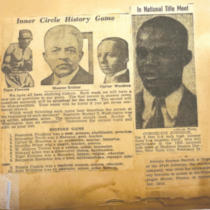Magazine

Teaching Black History in the Early 20th Century
An adult-education class brought Black history to life in a Depression-era Ann Arbor classroom.
By Sarah Derouin
In the Bentley Library, newspaper clippings pasted inside a scrapbook showcase the excellence of Black Americans. The yellowed paper features local athletes and future Olympians, scientists and scholars, and globally revered performers and artists.
The scrapbook was created by Leona McDonald, an Ann Arbor resident who was part of a Depression-era “Negro History” class for adults, held in the evenings at the Ann Arbor High School.
At the time, Black history was not part of the curriculum for high school students, and administrators at the Ann Arbor High School refused to hire any Black teachers. However, the school held adult education courses for the community on topics such as creative writing, aviation, and salesmanship. The classes were part of the New Deal, intended as a way of providing jobs and helping people learn new skills. Despite a history of federal funding for programs that largely benefited white men, the “History of the Negro Race” class received money for an instructor and was offered in the 1934–35 academic year.
Black History in the Early 20th Century
One of McDonald’s archived scrapbook articles, titled Early Africans Had High Place in Civilization, was part of a pamphlet written by Carter Woodson.
A child of formerly enslaved parents, Woodson was the second Black American to earn a Ph.D. from Harvard University. He founded the Association for the Study of Negro Life and History, ASNLH (now known as the Association for the Study of African American Life and History) in 1915 because the contributions of African Americans had been “overlooked, ignored, and even suppressed by the writers of history textbooks and the teachers who used them.”
Woodson created Negro History Week in 1926, with the goal of teaching school-aged Black children the histories of African Americans. It was held in February to coincide with Abraham Lincoln and Frederick Douglass’ birthdays. Many of the early lessons were put together by Black teachers and librarians, with the help of information from the Negro History Bulletin, produced by ASNLH.
Woodson’s article in McDonald’s scrapbook highlights overlooked achievements by early Africans, including the trial-by-jury process, iron smelting, and animal domestication.
McDonald’s scrapbook also features content by actor Richard Berry Harrison. And for good reason: Mr. Harrison was McDonald’s uncle.
In 1930, Harrison received his big break, landing the role of “de Lawd” in The Green Pastures, a play that opened on Broadway. Harrison’s success gave him a platform to talk about issues of the day, including the rise of Black playwrights. In one article he noted that a Black playwright could only find success writing about “Negroid” themes, but also pointed out that Black authors were better positioned to tell their own stories. “[White playwrights] write about the Negro; but I think the Negro can do the job better. He knows the thoughts and the language, and he understands the ideals and aspirations of the race.”
Long after the class ended, McDonald continued to collect clippings over the next decades, including articles about musical performances of her son Ike (born in 1938) and news about historical landmarks and current events. These snippets of news were not glued into the pages of the book but were instead slipped between the pages.
The scrapbooks were donated to the Bentley by Hazel Fields Grant, McDonald’s niece, and are available to the public for research.
Sources for this story include: Saperstein, Miriam: “Negro History Class for Adults in Twentieth-Century Ann Arbor.” Carter G. Woodson profile: naacp.org
